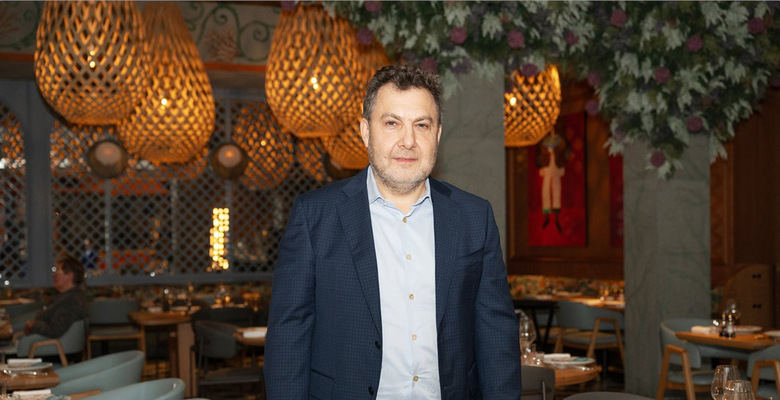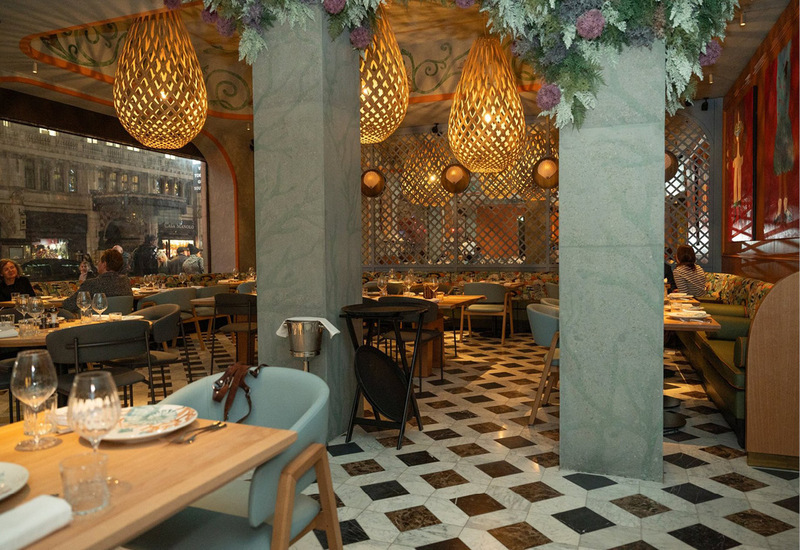
With a business empire in Moscow under his belt, Michael Gokhner has set his sights on London. A year ago he opened his second Bocconcino restaurant in Soho and this December, he launched Osteria Del Mare in Covent Garden. In this interview with Kommersant UK, Gokhner explains how he manages to juggle work in both Moscow and London despite the political and economic turmoil and shares insights on the contrast between Russian and English culinary tastes and business styles.
What’s behind your decision to ramp up your business in London?
My first restaurant in Mayfair opened ten years ago. I’d had absolutely no intention of starting a restaurant in London, it just turned out this way due to a combination of circumstances. Afterwards, I wanted to spend more time here but, for various business and family reasons, this didn't come to pass. Now the situation has changed and for the last few years, I have spent roughly 70% of my time in Britain. That's why I’ve decided to develop my business in London. Last year, we opened a second Bocconcino, In Soho and this year, Osteria Del Mare In Covent Garden.
Why is the new restaurant an Osteria and not a third Bocconcino?
That was also a dilemma; whether to work on the same principle as in Moscow, where there are branches of Bocconcino in different locations, or to try something different. Strolling through Covent Garden, I sensed a seafood restaurant would be a perfect fit for the neighbourhood. We tried not just to make a fish restaurant but to offer a mix of Italian food with other Mediterranean cuisines and a fish menu.

In the interval between opening the first Bocconcino and the next two restaurants, the pandemic and Brexit occurred. Life in Britain has changed markedly. How has this affected your business here?
If you ask most Londoners about this, they will groan theatrically, but I’ve handled crises in Moscow for many years, and I continue to do so. By comparison, these issues seem like a walk in the park to me. Nobody in either country felt very well during covid. Then there’s Brexit. Overall, what happened to my restaurant after Brexit? First of all, prices rose. However, in my 30-year career in Russia, prices rose year on year throughout those three decades and nobody died of it. Secondly, fewer people wanted to work in the restaurant. Mostly Italians and Spaniards were affected; they had problems getting visas so there were fewer of these workers on the market. Competition for staff began; we had to pay more to keep hold of people or, conversely, offer attractive conditions to tempt them to leave other establishments and work for us. This is an entirely routine situation, an ordinary aspect of business I have always had to deal with. It's been the usual state of affairs all the years I've done business in Russia.
What drew you to pursue a career in the restaurant business? How did it come about?
Three things attracted me to this business; the first is that, at that time, there were no restaurants to speak of in Moscow, only cafes catering to office parties and old Soviet establishments with pretentious decor, inedible food and appalling service, so there was no competition on the market whatsoever. Secondly, at quite a young age, I began to travel. I had always wanted to go abroad. I saw how things worked in other countries; the packed restaurants with fantastic food and great service. Thirdly, as people began to earn more, enormous demand appeared in Moscow for places to eat out. When I opened my first restaurant, El Gaucho, you can’t even imagine the dark alley it was on, but everyone who was anyone went there and the proceeds were tremendous. You could write an entire book about it.
How did you avoid mob takeover in the 90s?
A restaurant is one of the few businesses which can't be expropriated because it's hard to run. There are hundreds of restaurants which have been built and had colossal sums invested in them only to go bankrupt for one reason alone; they were badly run. So it's almost impossible to seize a restaurant successfully. There are so many problems, hidden pitfalls and headaches that few with backgrounds in other areas of business are able to manage them and deal with the day-to-day challenges, which are of an extremely varied character; from technical hitches to tax issues, culinary complications and architectural quandies.
Are you planning to open any more restaurants in Moscow or Nizhny Novgorod?
Definitely not in Nizhny, maybe in Moscow. I still have restaurants there and I fly to Moscow quite often. The market is still alive and it’s doing fairly well, but it's more profitable for me today to invest my money in London and open new restaurants here.
Has the cost of living crisis affected your business in London?
Not at all. A great many of the diners in London restaurants are tourists who come here to spend money and the question of inflation doesn't apply to them. The second group is people who live in London whose salaries have been adjusted for inflation. There are very many of these business people, so I don't feel any crisis at all. I can see demand for restaurants in London is strong. All the good places are full. The market here is very capacious and has enormous reserves of resilience. How is Russia different from Britain? In Russia, there is a culture of dining at home. Everything works quite differently here; cultural traditions have developed which encourage people to eat out. The income of those living in London is extremely high. For them, going to a restaurant and spending £100 is nothing out of the ordinary; it's an everyday occurrence. In Russia, going to a restaurant and spending, let's say, even just 5,000 roubles (£40) only happens on special occasions or if you're having dinner with friends. As I'm in the restaurant business both here and in Russia, I see that financially speaking, diners in London think far less about the expense. They rarely look at the prices on the menu to work out how much it will all cost; a price difference of £5 between dishes doesn't bother them at all.

You’ve opened two restaurants here since 2022. Did your Russian origin cause you to encounter any bureaucratic obstacles?
Not at all. Although I did have a bank account closed. You see, when everything had just started in 2022, my Mayfair restaurant suddenly received a letter saying HSBC had closed its business account and that I had three months to open a new one with a different bank. It really does seem there was some kind of connection to international events because I went to one bank, then to another and a third and I only managed to open a new account with great difficulty. But I haven't experienced any bureaucratic problems. I don't have British citizenship, I have an Investor Visa which is tied to my Russian passport, so every time I went to a bank I showed them my UK residence permit, together with my Russian passport and everything turned out well in the end.
Which of your three London restaurants is the most profitable?
Osteria Del Mare has only just opened so it doesn't make anything yet. Of course, Bocconcino Mayfair, which has already been open for ten years, makes the most. It's been in the market for a long time, everyone knows it and every day it sells wines at £1,500 to £2,000 a bottle.
Could you tell us its profit margin?
Around 20% and what’s more, the income of this one restaurant in Mayfair is roughly equal to the combined income of six Moscow restaurants. It's not just a different level of profitability, London is a completely different scale. This is due to the fact the rouble has fallen sharply and purchasing power has slumped. They don’t have that problem here.
And what's the average profit margin in Moscow now?
Around 12%.

Why has Bocconcino Mayfair been such a resounding success?
For the first two years, its performance was only middling. Why? I had tailored it for a Moscow clientele, but Mayfair and London turned out to be totally different. They have completely different tastes and they require totally different things.
How precisely are they different?
People are more demanding in Moscow. The restaurant industry there is more extensive; restaurant menus are far more opulent than in London, as is the service provided to diners. People’s tastes are far more sophisticated, even jaded, but they spend far less money. The situation here is completely different. The English are a little less discerning in culinary matters so they are slightly easier to please. They are also ready to pay higher prices. If what you're offering is good to eat and high quality then success is guaranteed. So, two years after I had opened the Mayfair restaurant, I reconsidered the concept. We redecorated the interior more luxuriously and equipped one room with a large bar with musicians and a DJ playing. Atmosphere is important. I doubled the prices and we had more visitors. Naturally, we didn't just put up prices, we began to use more premium products, such as expensive wines. We had regular wines, delivered by our suppliers, and we also began to purchase exclusive ones, which we buy at wine auctions a couple of times a month. So then we had an exclusive product and a buzzing atmosphere. The restaurant acquired a completely different appearance. Enormous crowds came. The marketing strategy is also crucial. I set up a marketing group and we partnered with a PR agency which works with us regularly. Every week influencers visit. We focused on this aspect of the business as it's key to drawing in guests and it paid off.
Where is there more state regulation of business, here or in Russia?
There's none whatsoever here. Well, If you ask an English or Italian person, they will probably put their heads in their hands and say there's an awful lot of red tape but, compared to Russia, there's very little.
Where are suppliers more reliable, in London or Moscow?
There are no issues in either place. Whatever country they live in, business people have very similar qualities, so anything related to business operations is well-run, both here and in Russia. Given that it's always been so difficult to bring quality products to Russia and now it's even more so, I would say people there are more professional. That's because products are transported enormous distances to get to the restaurant in Moscow, whether from Europe or Central Asia. For instance, tomatoes are brought in from Tashkent in Uzbekistan. However you look at it, it's much simpler in London.
Several restaurateurs from Russia work in London. Do you socialise together? Do you compete for customers?
We know each other and we do socialise. If I call them up, they'll help me. It's curious that when I go to Moscow and I tell my friends that I'm running a restaurant in London their eyes all bulge out and they ask the same question; “Are all your customers Russian?” and when I tell them that Russians make up roughly 1% of my clientele none of them believe me. So how can we be competitors when none of us even has any Russian diners? They are a tiny portion of London restaurant goers.
Have you had any regrets during your long entrepreneurial career?
I suppose it's pointless regretting anything. Mistakes give you experience. So does lost money, so I try to have a philosophical outlook on it all. I believe that lost money, failed restaurants or other disappointments are just another experience that can be used positively to give me new opportunities in the future. It just depends on your temperament. Overall, I tend to look on the bright side of life.






